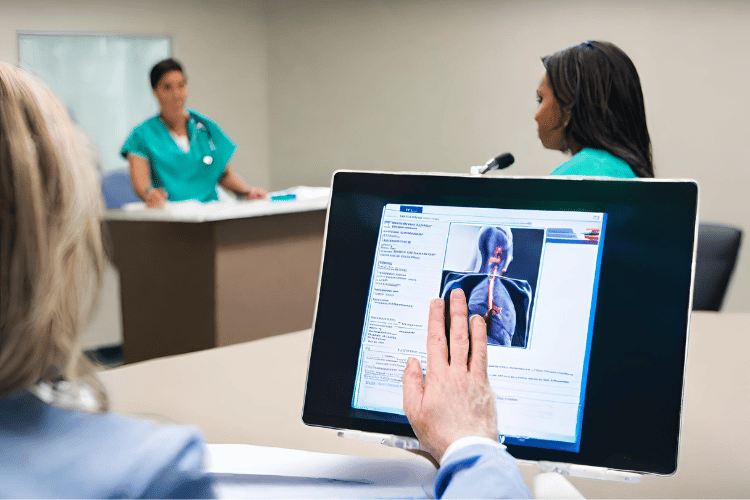Incomplete Electronic Medical Records (EMR) – Unseen Threats and Legal Strategies in Healthcare Litigation
Comperio Legal Services provides skilled attorneys the electronic medical record analysis and expert witnesses they need to win. To learn more about how this legislation impacts your case, schedule your FREE, no-obligation case consultation today.
Do you have an expert understanding of the risk posed by the electronic medical records in your case? Discover the truth. Schedule your FREE, no-obligation case consultation today.
Balancing Technological Progress with Operational Challenges in Healthcare
Electronic medical record (EMR) systems have significantly advanced healthcare by improving the legibility, readability, and searchability of patients’ medical records. However, like all emerging technologies, EMR systems have drawbacks, too, as they have inflicted heavier workloads, increased charting times, and additional management duties upon healthcare workers. When a clinician generates a patient note in an EMR system, they often pull information from the patient’s chart, such as lab values or nursing documentation. Since copy-pasting information in this way makes healthcare workers likelier to overlook mistakes, they are expected to review and correct any inaccurate information before signing the note and making it available for the interdisciplinary team to review and reference. So, frequently, clinicians open a note for a patient, are then derailed by other patients’ needs, and leave the note to be completed later. EMR systems then save the incomplete note in an unsigned state, which allows the original user to return to the note to certify, sign, and publish it. This has led to incomplete documentation becoming a common issue in medicine because the complexity and demands of the health system on providers prevent healthcare professionals from completing notes in one sitting.
The Silent Influence of Incomplete Notes on EMR Revelations
In many leading systems, such as Epic and Cerner, incomplete notes are unavailable in patients’ medical records by default because they are unsigned. However, they are discoverable. Some incomplete notes are harmless, but others can have the power to change perspectives on a patient’s diagnosis or treatment plan when the information in that note is crucial. At times, incomplete notes can be a missing piece to the puzzle, which a large team of caregivers never knew existed. In such cases, incomplete notes disrupt the flow of communication and can harm patients by reducing the quality of their care.
There are various methods to determine if incomplete notes exist about a patient’s visit or stay at a hospital. Working with an expert witness knowledgeable in EMR systems can be beneficial as these individuals can shed light on the operating methods and note production processes of various EMR systems. Additionally, expert witnesses have the knowledge and skills to uncover where incomplete notes are stored in an EMR system. In typical situations where incomplete notes occur, providers will pre-document a visit by creating a note they plan to finish after the visit but forget to return to it. In turn, many incomplete notes are created but not entered into medical records as authorized or signed. However, they are all stored in the EMR system’s cloud for retrieval, which is where an expert witness comes in. Therefore, what makes a note incomplete is whether it is signed and published for others to see.
Navigating the Impact of Incomplete Notes with an Expert Witness
Of course, both parties in a medical malpractice case should be aware of the discoverability of incomplete notes. Plaintiffs should consider using incomplete notes as leverage, especially if a saved note is a smoking gun against its creator. Meanwhile, defendants should consider incomplete notes as a severe blind spot and should, therefore, prepare to defend their incomplete notes in court. One study showed that incomplete medical records burden healthcare facilities with significant financial, administrative, and legal challenges, as auditors have found critical information in 7-10% of incomplete notes in recent years. While this margin seems slim, we must consider that this rate is alarming, given that medicine is a high-stakes field. Therefore, plaintiff attorneys should make it a standard of practice to always request incomplete notes and consider consulting expert witnesses, as they can find important information they would have never found otherwise. By making these practice changes, plaintiff attorneys will increase the odds of finding crucial information that could turn the tide in their favor. Conversely, defense attorneys should make it a standard of practice to work with their defendants to review all activity in the EMR and analyze all note deficiencies and unsigned entries to minimize risk exposure.
We Help You Navigate
Do you have an expert understanding of the risk posed by the electronic medical records in your case? Discover the truth. Schedule your FREE, no-obligation case consultation today.
LEARN MORE
Stay up-to-date with the latest industry updates by signing up for Comperio’s monthly newsletter.




